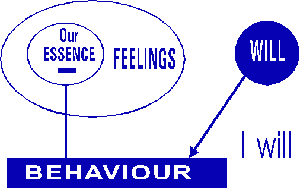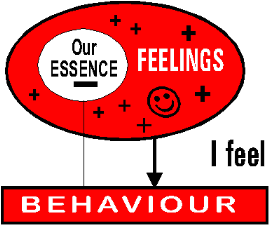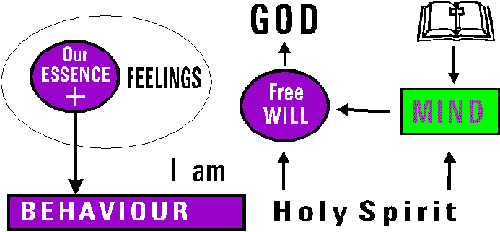
Why it is necessary to define sin as a violation of the Law?
Unpleasant manifestations of man's spiritual condition appear in his feelings and behavior, so he tries to remove them in different ways. The sin itself is not bother him, but only its manifestations, for they destroy his pleasant feelings and disturb his relationship with surroundings.
We try to be good by force in order to harmonize, by a "correct behavior", our relationship with the voice of conscience and with the surroundings. Perhaps in it we do succeed formally. But the most we can do is to change our behavior. Our nature remains the same; our heart, although restrained in its expression, remains sinful. In the course of time just a sublimation occurs of the old motives into new forms of our thoughts and behavior. We become ready to do good and self- sacrificing deeds, but we are moved to them by guilt, self-loving or some other sinful motive. Holy Scriptures say about idleness of man's attempt to have his heart changed:
"Can the Nubian change his skin, or the leopard its spots? And you? Can you do good, you who are schooled in evil?" (Jeremiah 13:23)

Since man is able to change only his form of behavior, not his essence too, his definition of morals tends to be superficial; adjusted to his abilities.
It deals with behavior, but not with motives too. "It is not important what deed I did than which motives move me" think the bearers of such morals. The followers of some oriental religions, for example, consider to be sin to crush a bug even accidentally, but if we have a hatred in our heart, then we will not suffer consequences.
The followers of Krishna, speaking about Krishna universal attractiveness, claim that it is not important which motives drive a man to serve God and that God attracts both good and evil people, in order that all of them find a fulfillment of their motives in Him. Some people are even not aware of existence of the motives moving them to certain behavior. A Jehovah witness repented with such: "Forgive me, God, for I committed 27 sins! I slammed the door strongly when going out from the room, a walked over the grass although it was forbidden, I crossed the street although there was red light, ..."
Perhaps his behavior represents a sin indeed, but this believer did not repent the motives he sinned out, but only the manifestations of his attitude in behavior. The cause of his sinning still remained in his heart. What is cause of such a superficial approach? The doctrine of Jehovah witnesses is full of the demands not binding morally, not demanding a reform of the motives of human heart. The superficial demands induces a man to a superficial thinking, and thus he never recognizes whether behind his good intentions may lie sinful motives.
A strict ban on the traditional dyeing eggs, birthday celebrations, blood transfusions and various other bans induce a believer to form an opinion that sin is in certain action, and not in the motives for that action. We must keep in mind that in man's heart there is not an tendency to dye eggs, birthday celebrations and blood transfusion. A man can do all of it out of both good and bad motives, depending on his spiritual condition. By mere restraining oneself from dying eggs, birthday celebrations and blood transfusion abstinence we can not remove the evil from human heart.
A blind observing the rules induced Jehovah's witnesses to an irrational behavior, the same as it was with Pharisees. A Jehovah's witness will hold the health commandment of the ban on blood consummation so strictly that he will sacrifice even his life to save his health (evading blood transfusion). Jesus showed clearly that man had not been made for the sake of the law, but the law for the sake of man.
A superficial and blind observing the drove many people to the conclusion that the moral issue is a relative matter, for (ones have these rules, and others those ones. However, the law looking at motives is not a relative one, but, as we have already seen, is quite reasonable and functional. It will show to us that behind our good intentions often very bad motives can be hidden.
We try in different ways to invoke in us pleasant feelings, in order to find in them strength for our goodness. We achieve that with certain psychological atmosphere, help of appropriate music, feeling of closeness, alcohol, drugs or, perhaps, certain religious system. Maybe we really feel love and under the influences of our feelings we do good deeds. However, goodness moved by feelings is a biased goodness. It is not appropriate to man's real interests. Its goal is that the one to whom it is directed should feel happiness, but not become happy as well. Thus, one will, out of the feeling of love, offer to his friend a drug or an alcoholic drink. He will wish to share the feeling of happiness with his neighbor but not the happiness itself (for he has not got it). In such a way under the influence of enthusiasm, Eve offered the forbidden fruit to Adam. It was the first case of fanaticism caused by feelings.

Fanaticism out of feelings does not demand a renunciation of sin, for the fanaticism is based on the change of feeling, not on the change of our essence. That is why it does not bear fruits, which are in accord with all Ten commandments of God's moral law. Its bearers therefore fear the Decalogue. They appeal only to the commandments which say "Love...", for they allow a superficial interpretation, and thereby the legalization of fanaticism as well. However, an unjust heart is also able to feel love.
For example, man feel love for himself sincerely, and at the same time he smokes and drinks alcohol, therefore he does not love himself. The emotion of love and motive of love are not the same. Under the notion of goodness a person moved by feelings thinks about a satisfaction of others' selfish motives. He or she wishes other people around him to feel pleasantly and thinks that that is an answer to their real needs.
A fanatic moved by feelings calls sin most often the outbursts of his negative feelings. Therefore he wages his spiritual battle on a wrong plane, unaware of the problem being hidden deeper than feelings - in his motives.
We can influence the contents of our thoughts, feelings and actions by our will, but we cannot influence the contents of our heart by this "operation". Its motives still remain sinful. By avoiding negative thoughts and feelings we only remove a reason for manifestation of our sinful nature and thus we escape from the problem which we still bear in the depth of our soul.
In order to achieve happiness and love, it is necessary that a man experience a change of what he is - of his essence: "Guard your heart more than any treasure, for it is the source of all life." "Wicked thoughts, murder, adultery, fornication, theft, perjury, slander - these all proceed from the heart;" (Proverbs 4:23; Matthew 15:19)
If we deal with ourselves trying to change our hearts, we will get tired and disappointed, for we will try the impossible. Only God can change our heart.
"I will sprinkle clean water over you, and you shall be cleansed from
all that defiles you; I will give you a new heart and put a new spirit within you; I will
take the heart of stone from your body and give you a heart of flesh. I
will put my spirit in to you and make you conform to my statutes, keep
my laws and live by them. " (Ezekiel 36:25-27)

Contrary to all superficial definitions of righteousness, which induce a man to correct and covers up the symptoms of his own spiritual state on the level of his actions and his feelings, there is a necessity for definition of his very spiritual state. It is necessary to define a sin like a state, bad in itself, and therefore induce a man to solve his problem at the root. We are given such a definition by God's moral law. Love is an accordance with the law, and sin is a breaking of the law:
"Love is the fulfilling of the law." (Romans 13:10)
"Sin is lawlessness." (1 John 3:4)
Has God discovered somewhere his law to a man?
In Old Testament we have the revelation of God's moral law, expressed in two commandments, which define our relationship toward God and our relationship toward fellow-man:
"Love the Lord your God with all your heart and with all your soul and with all your strength." (Deuteronomy 6:5)
"You shall love your neighbor as yourself." (Leviticus 19:18)
Is God law expressed through two commandments, reprimanding idolatry, unholiness, disrespect, vice, greed and all other ways of behavior which are fruit of our separation from God (and our primeval dissatisfaction)? Is the definition of the law, in this way, clear enough not to be understood superficially?
Of course, it is not!
In accordance with such compressed definition of the law apostle Paul could not certainly have said:
"I should not have known what it is to covet if the law had not said: You shall not covet." (Romans 7:7)
Obviously, man needs a deeper definition of the Law than that given through two commandments and it's obvious that it exists when apostle Paul mention it.